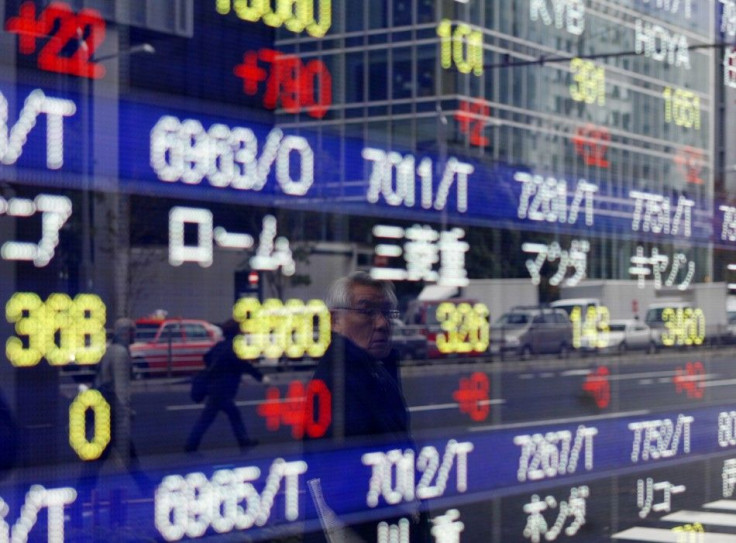Nikkei Closes Up Friday for Biggest Weekly Gain in 2 Years

(REUTERS) -- The Nikkei average extended gains to log its biggest weekly advance in two years on Friday, though the mood was far from upbeat given uncertainty over whether Europe will next week manage to cobble together steps to counter the debt crisis there.
After rallying on a move by the world's central banks to ease funding strains among banks, the Nikkei now faces major resistance, including from its 75-day moving average, a sustainable break of which is seen as depending on Europe.
If European leaders can agree on a more active role for the European Central Bank and possibly aid from the IMF, that would be positive. But that looks difficult, so there's risk that we are in for a major disappointment next week, said Norihiro
Fujito, senior strategist at Mitsubishi UFJ Morgan Stanley Securities.
The benchmark Nikkei added 0.5 percent to 8,643.75, for a weekly gain of 5.9 percent, its biggest since the first week of December 2009. In one positive technical sign, the
Nikkei stayed comfortably above its 25-day moving average, at 8,573.
Still there are many more hurdles for the Nikkei, such as its 75-day moving average at 8,682 and the Ichimoku cloud that looms above 8,700.
Right now we are in the middle of the market's trading range from September and October, which means there will be a lot of selling interest here, said Hiroyuki Fukunaga, CEO of Investrust.
The broader Topix climbed 0.6 percent to 744.14.
Trade volume slowed to 1.57 billion shares, in line with the monthly average, from Thursday's 2 billion. Advancers outnumbered decliners by 960 to 555.
LACK OF BUYERS
Many doubt that the Nikkei can break through its Oct 31 high above 9,100 in the near future, given the lack of buying from foreign investors, who have been a major driving force behind any rallies in Japanese shares in recent years.
The problem is that there are no buyers who are ready to chase the market higher. Japanese trust banks and individual investors only buy when the Nikkei is near 8,000. They'll then sell if it rises to 9,000, said Mitsubishi UFJ's Fujito.
European investors, likely hit by home-grown debt problems, have been consistently selling Japanese shares. Data from the Tokyo Stock Exchange showed on Thursday that foreign investors were net sellers of Japanese shares for four straight weeks until last week.
Markets are looking to the U.S. employment numbers before moving and the uncertainty in Europe is still keeping many participants out of the market, so despite slight ups and downs based on sentiment, we remain stuck at a low level, said Mitsushige Akino, chief fund manager at Ichiyoshi Investment Management.
Investors also remain cautious ahead of the Dec. 9 Brussels summit of European leaders, seen as a make-or-break moment for the currency bloc.
European Central Bank President Mario Draghi signalled on Thursday the bank was ready to act more aggressively to fight Europe's debt crisis if political leaders agree next week on much tighter budget controls in the 17-nation euro zone.
As exporters and banks suffer from worries over Europe, some investors continued to look to domestic demand-oriented shares.
Social gaming company DeNA became the most actively traded stock by volume, and rose 8.1 percent to 2,519 yen after it won approval to purchase a professional baseball team.
JPMorgan also raised its rating to overweight from underweight, and Credit Suisse started coverage of the company at outperform.
Honda Motor underperformed the auto sector, dropping 0.2 percent to 2,479 yen, after the company's U.S. auto sales dropped 6 percent in November, having fallen every month since May.
The firm's U.S. market share tumbled from almost 11 percent to just over 8 percent in the same period, as Honda lagged rivals in recovering from supply disruptions caused by the March earthquake.
Toyota Motor Corp and Nissan Motor Co both added 1.1 percent.
On the other hand, underlining weak investor appetite for financial stocks, a planned initial public offering of Japan's Nikko Asset Management that looked set to raise 45.5 billion yen ($586 million) for its main shareholder was shelved on Friday
due to weak market conditions and a worsening of Europe's debt crisis.
Shares of banks and securities brokerages have suffered from worries about a possible global financial crisis originating from Europe.
So far this year, the TSE's bank subindex has fallen more than 20 percent, while its brokerage subindex has tumbled over 45 percent, compared to a 15.7 percent drop in the Nikkei.
© Copyright Thomson Reuters {{Year}}. All rights reserved.





















